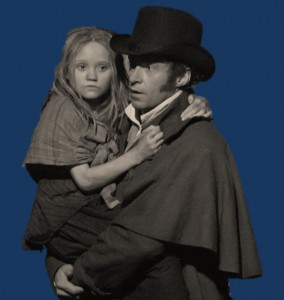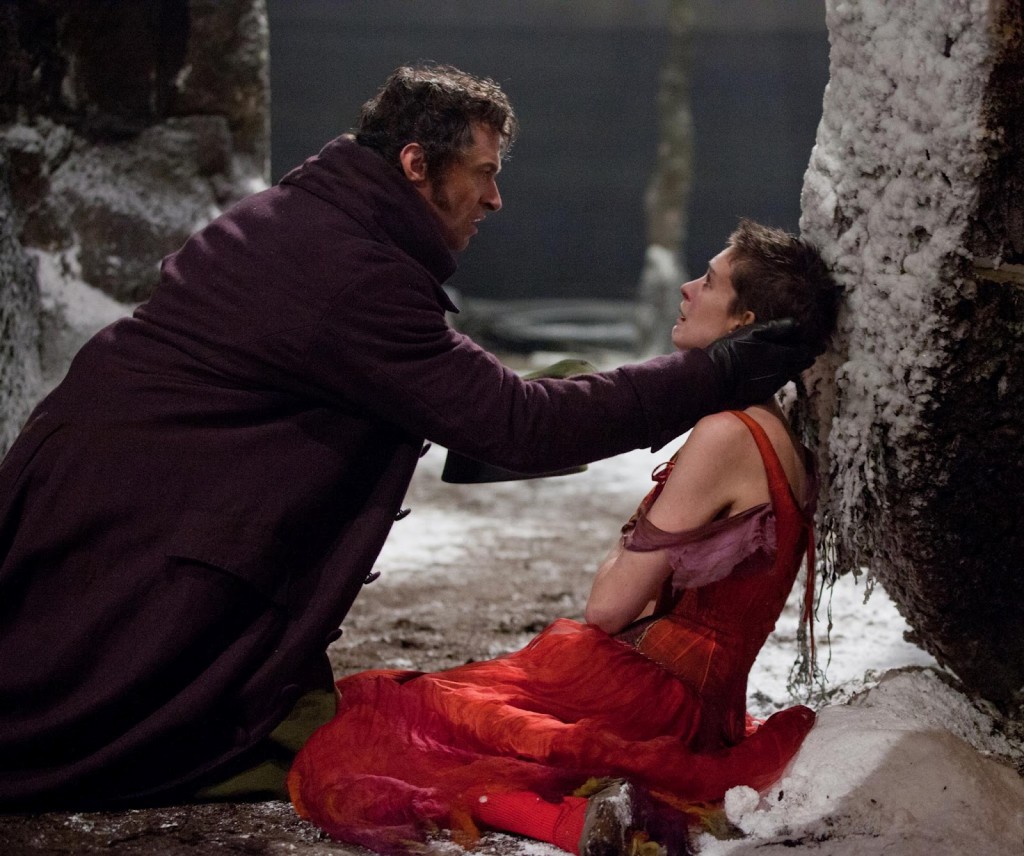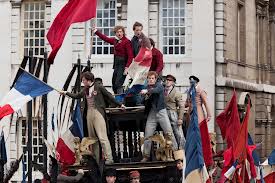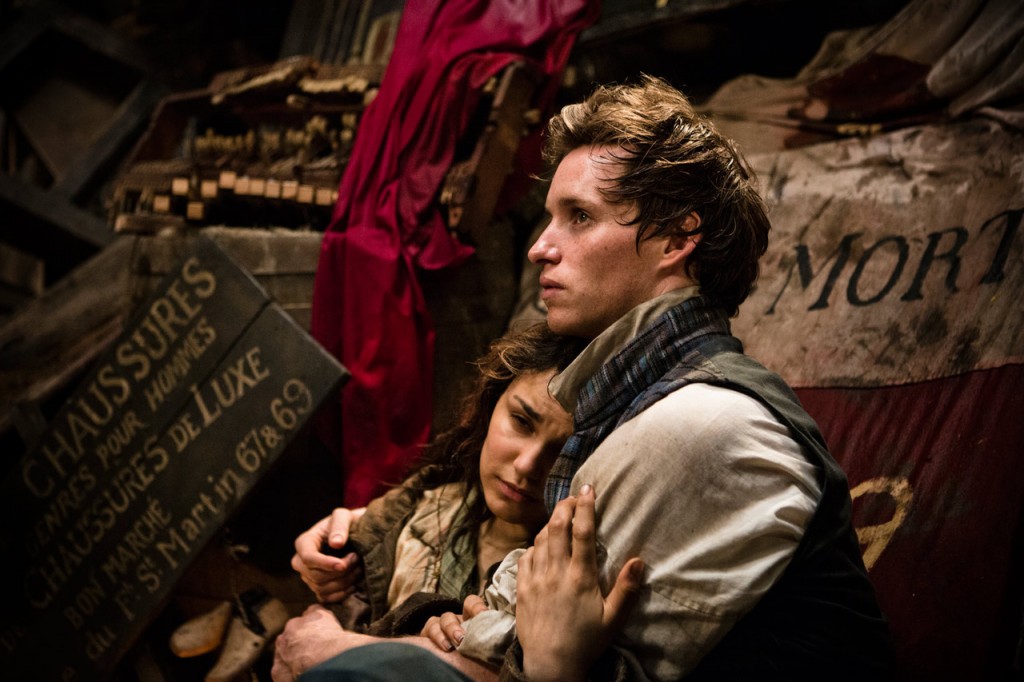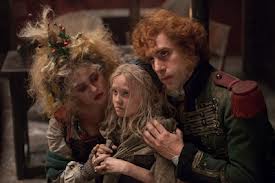What to do?
What to say?
What I tell you about Les Mis-er-ab-les?
Beneath the music that will insinuate itself into your mind, beneath the acting that will have tears streaming down your face, beneath the scope the movie offers that is not available on a stage, there is a story.
And what a story.
The story of the reformed and restored criminal Jean Valjean from Victor Hugo’s great novel is the story of humanity, of despair, but most of all, of redemption.
If haven’t heard the story, here is a rundown. It’s helpful to know the story going in because it moves quickly and sometimes is hard to follow if you are unfamiliar.
As the musical starts, Jean Valjean finishes serving nineteen years hard labor for the theft of a loaf of bread. Paroled, but not freed from his shame, he sets into the world with his moral code of an eye for an eye, of turning his heart into stone.

But God has another plan. An encounter with a priest shows Valjean another way, a way of grace, of redemption, of reprieve.
Jean Valjean vows to live his life in this new way, something beyond rules and just rewards, something based on love and not justice. Years later, as chief businessman and mayor of a Paris suburb, he has a chance to help a prostitute named Fantine, but the need is great. The dying mother leaves behind a little girl, a girl Valjean promises to protect.
However, the former convict has broken parole to embark on his new life. A police officer named Javert makes it his personal mission to bring the fugitive to justice. Valjean with the little girl Cosette flee to Paris, where they find yet another new life with seething poverty and revolution as a backdrop, a chance at love, and the relentless footsteps of Javert constantly echoing behind them.
Fans of the musical, as I have been for decades, will love the movie. For the most part, the film sticks straight to the outlines of the musical. Some little tweaks are made, a missing song intro here or a switch in order there, but the tone of the musical remains. A few plot points come from the book, but are not in the musical.
In fact, it’s remarkable how different two experiences can be with the same lyrics and music. Director Tom Hooper takes full advantage of movie magic, giving street scenes, sewers, and the Paris skyline the kind of scope and presence only implied on a limited stage. The first number of the second half, Do You Hear the People Sing?, fulfills the promise of the music by filling up a Parisian thoroughfare with the discontented and disenfranchised beginning to rally around a revolutionary flag. It’s positively stirring.
This is not a movie to replace the musical, but a different, complimentary experience.
The other difference between movies and stage is that the camera can capture the face of an actor, while a play audience has to watch from a distance. The cast of the musical sang the songs as they filmed, as opposed to taping in a studio and dubbing over, so the words are raw and the acting integrated with them.
The most powerful example, indeed the most powerful scene in any movie this year, is Anne Hathaway as Fantine, a mother forced from respectable employment to the streets and prostitution to support her child. When she sings I Dreamed a Dream, the anguish in her voice and her eyes unite to make a heartbreaking whole. It is nearly impossible to watch without tears. Indeed, she is considered nearly a lock for the Oscar for Best Supporting Actress for this role.

It’s all the more remarkable in that Hathaway’s voice, like that of the bulk of the cast, is nowhere near Broadway quality. It is not the skill in her notes that makes the effect, but the emotion. The weakest link in the film is Russell Crowe as Javert, the relentless rule-enforcer, but even he conjures up powerful emotions and themes. Likewise, Amanda Seyfried as grown Cosette acquits herself passably.
Hugh Jackman as Jean Valjean runs the range of emotions from haggard and hateful to sacrificially loving, from frightened to secure, from sinner to saint. A Tony-award winning Broadway actor as well as a bona fide movie star, Jackman aims more for emotion than for Broadway vocal power, and succeeds. He also performs the new song in the production, Suddenly, a lullaby of love to little Cosette.
Stage veterans were cast in some big roles. Marius, the revolutionary, is played by the adorable Eddie Redmayne, no stranger to the stage in London and New York. Samantha Barks, who has a long stage resume and played Eponine in London, reprises her role here. Her voice is so powerful and pure that it stands out among the other cast.
Helena Bonham Carter and Sacha Baron Cohen are well cast as the despicable Thenardier couple, the Master of the House, looking only to line their own pockets. Cohen, whom we know best from Borat, is an unexpected delight in the role.
The story, however, is the heart and soul of the movie. Much will be written, and indeed has been over the years, about the contrast of two men. One lives by the way of grace. The other is a slave to justice. Their lives intersect and interweave, but grace perseveres.
It is one of the most beautiful stories ever written, one of the most beautiful scores ever composed, expertly set to film. Gather up the family this Christmas. Don’t miss it. In fact, this movie reflects exactly why Christians believe Jesus came to earth.
He came for the miserable ones, Les Miserables.
Rated PG-13, the epic story shows the despair and dregs of life as well as victory. There are scenes of violence, murder, and prison savagery. Fantine is reduced to prostitution. Although the movie does not explicitly show sex, the lyrics refer to the act of prostitution and Fantine’s shame as she takes her first customer is shown, with the motions of her body evident but the man never seen. There are battle scenes, heroically portrayed and not particularly bloody, but filled with death, death of a child, and a suicide. The movie deals with universal and human themes in ways that help children understand the world and humanity, but parents should be ready for these themes. Not appropriate for elementary aged children, probably.

